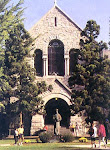Walt Greason is an expert on mentoring independent studies and internships,having worked with over 25 students in his six years at Ursinus. Walt began with a discussion of mentoring, especially the challenges of mentoring students at different skill levels and preparing them for longer research projects. He encouraged us to consider the range of preparation of high school and early years of college--even in a class of one, each student will need different tools to come up to speed, and the "speed" will be different for everyone. Walt laid out a structure for independent research with students that I found admirable. He suggested that one might begin with a critical assessment: 1) What do I bring to this project? 2) Develop a clear and sustained plan, with benchmarks and achievements for which students are held accountable. The third step: modeling professionalism--showing the student what you do in your field, as a scholarly practitioner. Finally, Walt noted to the strengths Ursinus faculty bring to mentoring: our map for lessons, from the 50-minute hour to the structure of the semester; our willingness to share our passions with our students; and the institutional support that helps make independent work possible (Summer Fellows, Study Abroad, internships). He also encouraged us to consider areas of improvement: why not consider the campus as classroom? Ursinus College as a lab for urban/suburban development? Walt offers a model for helping students to think critically about their locations as students at a residential college in a rapidly changing suburban landscape; how eye-opening it could be to consider the Collegeville/Montco region as an advantage, rather than an impediment!
While the disparities Walt mentions of skill level, engagement, and sense of inclusion within the college community affect the success of independent research across the board, they are particularly pertinent for students of color, economically disadvantaged students, and first-generation college students in a majority white, middle-class institution. Even the act of visiting office hours is laden with cultural capital, as is the level of agency needed to complete an independent project. As faculty members, we should be aware of the obstacles that exist to students' agency--and the self-conscious mentoring Walt discusses models how to meet students half-way.
Lynne Edwards followed with a discussion of inter- and intra-personal challenges that can occur during independent projects. Independent projects, she noted, are required, but can also be transforming, rewarding, and terrifying (to us and to them!). The mandatory nature of the ILE can become another obstacle to agency--students may see these projects as a hurdle rather than an opportunity. To make them less burdensome to us, Lynne made several recommendations: first, is the student passionate and prepared? Have you taught this student before and assessed his/her capacity for self-motivation? (She has a "top secret" assignment to help assess this--but if I described it, she might have to kill me.) Second, Lynne recommended we distinguish between teaching and mentoring--hearing students rather than simply talking to them, and moving toward a dialogic exchange. Lynne also discussed the long-term value of generating student excitement: many of the students who work with us have never imagined the academic life. Some man have never developed their own task, or learned to work from insight, intuition, or a sheer interest in something odd or unusual. Intuition is hard to teach--we've honed ours through years of experience. Yet Lynne showed that it can be modeled, and that modeling can be inspiring.
Tony Lobo wrapped up our discussion by talking about the differences that exist--or appear to exist--between mentoring in the sciences and the other disciplines. Tony considered whether the typical science model, in which students work on an existing project, constitutes an "independent study." In the science model, students are mentored from early to upper-level courses, and upper-level students assume a role in mentoring students earlier along. He then discussed the benefits and drawbacks of this model: there is a focus in this kind of research on products, teaching students to generate results, in order to write a successful grant to fund more research. Is peer mentoring beneficial? (The lab, as Tony noted, is set up like a grad school lab, in which advanced students mentor beginning ones, and the PI is off writing grants--is that a good model for an undergraduate institution?) And--as Lynne mentioned--are students conducting research because they want to, or simply because they have to? Despite Tony's critiques of the lab structure, this made me think about how humanities students, who tend to work in isolation, might benefit from such partnerships.
There were a number of excellent questions that came up, which I would love to hear your opinions about (maybe they could become a topic of a Common Hour next year):
What do you do with students who aren't self-motivated?
Internships: what might you do with them? Becky reminded us that there are all kinds of curiosity, not just academic.
How much independence is necessary to describe something as an ILE? (Projects discussed here ranged from Summer Fellows to a 2 1/2 year project.)
How do others set objectives and learning goals in independent study projects?
After the independent study/internship has taken place, how do you evaluate the student's growth, academically and personally?
There has been a significant shift in the relative importance of research and teaching over the past 2-3 decades (at least in the sciences, maybe more broadly) in undergraduate education. Are we now spending too much time and faculty resources on classroom teaching (at the expense of actual learning)?

No comments:
Post a Comment